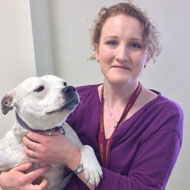'More openness' needed to bridge the gap between RVNs and RCVS

Lucy is one of three veterinary nurses standing for election to the VN Council.
The Pankhurst sisters “show just how remarkable the effect can be when a few strong willed people make the effort to stand out from the crowd and be heard,” says Lucy Bellwood, a candidate in this year's VN Council elections. “Without their dedication, bravery and strength the country would be a very different place.”
Lucy, who is centre co-ordinator at Myerscough College, is one of three veterinary nurses standing in the VN Council elections, which opened to votes last week (March 19). She believes RCVS communications should be more tailored to RVNs, to facilitate better engagement between nurses and the college.
“I do feel that in some eyes the RCVS can feel very distant to a lot of RVNs and students,” she says, explaining that the “perceived distance” between nurses and the college could be behind the relatively low response to last year's elections, in which only 11 per cent of RVNs voted.
“[This] is extremely disappointing when where have been such significant advances in the profession in the past few years,” she notes. “I think...more openness from the RCVS would be very beneficial in improving relations – RVN specific question times or roadshows perhaps? If RVNs knew what the RCVS do behind the scenes they would be much more likely to take an interest.”
Similarly, while the RCVS actively uses social media and various other methods of communication, Lucy says this activity “could be made a lot more relevant to RVNs in practice and they could potentially generate a lot of feedback and communication both ways.
“Formal letters have their place and can convey important notices and information effectively, but I feel they can somewhat increase the distance between the college and its members, and I have found the RCVS newsletters can contain a lot of information that is of little use or interest to a lot of nurses in practice.”
Such openness and communication is “vital” in a profession with such a wide range of individuals, she adds, and the college needs to demonstrate its understanding of life “on the shop floor”.
“My own circle of friends, both professionally and socially, extends to some real characters! Like most people I have strong opinions on some issues, and having an informed discussion or debate can make you see things from a different point of view, even if it isn’t one you agree with yourself.
“Keeping an open mind is vital, especially when working in a profession that brings you into contact with people from all walks of life.”
As well as improvements between the college and RVNs in particular, Lucy says more could be done to raise awareness of the fact that the Vetlife helpline is available for veterinary nurses and students, as well as vets.
Stress and mental health issues are a major concern for a profession with disturbingly high suicide rates and Lucy believes increasing awareness of the helpline “would be a very easy and effective way to provide support to someone who is having problems with stress, and other mental health issues.”
Nationally, she believes there is a lack of understanding of how easily mental health issues can arise. Raising awareness of this and how to deal with it in practice, through roadshows and CPD for example, would be “hugely beneficial”, she says.
The successful candidates will be announced in May, before taking up their positions on council at the RCVS AGM in July. Should she be elected, Lucy says she would like to help raise awareness of nurses' “extensive work and skills” among the pet-owning public. “There are many avenues that could be explored to increase public perception of the profession, and I feel that this could be achieved with the right focus in place,” she adds.
Lucy would also like to see changes to the current VN syllabus, which she believes is too focused on academic rather than practical skills.
“I don’t for a minute feel that the qualification needs to be made easier or ‘dumbed down’ in any way, however I do feel that the qualification could be made more accessible to the many learners who favour practical over academic learning.
“There is the element of relevance as well – some of the content and skills within the current diploma focus on areas that will be of little use to many students when qualified.”
To read our full interview with Lucy, visit www.vetcommunity.com. Log in or sign up for a free account to discuss the elections in the VetCommunity chatter zone.



 The veterinary mental health charity Vetlife is inviting the veterinary community to join it for a sponsored cold-water dip.
The veterinary mental health charity Vetlife is inviting the veterinary community to join it for a sponsored cold-water dip.